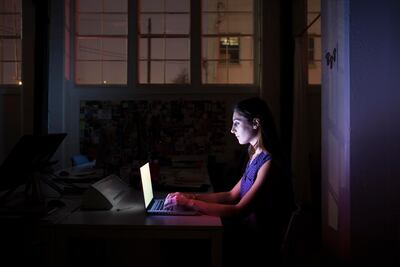It’s 2am and I’m loading up a season of some random show in my Netflix queue. In less than six hours, my alarm will start ringing to wake me up for work. I am tired, I know I need sleep and yet there is a … stubbornness, if you will, that’s winning the fight against reason.
This has become a common occurrence, especially as the boundaries between work and personal responsibilities melted away in the chaotic whirlwind this past year. I needed and created my “me time” and, in doing so, stumbled headfirst into a phenomenon plaguing thousands worldwide: revenge bedtime procrastination, sometimes known as revenge sleep procrastination.
What is revenge sleep procrastination?
The concept of sleep procrastination at large was introduced in a 2014 study by Utrecht University in The Netherlands, which defined it as “failing to go to bed at the intended time, while no external circumstances prevent a person from doing so”.
The term “revenge” adds a deeper psychological layer to the definition, hinting at the act as being a form of rebellion, whereby people delay sleep with the sole intention of creating more time for themselves where they have control. It’s thought to have been birthed in China in response to the country’s infamous 996 working-hour system – working from 9am to 9pm in a six-day week.

Last year, at the height of the pandemic, the term began to gain worldwide traction after journalist Daphne K Lee, tweeted: “Learned a very relatable term today: revenge bedtime procrastination, a phenomenon in which people who don’t have much control over their daytime life refuse to sleep early in order to regain some sense of freedom during late night hours.”
The concept blew up further after user @samanhaiderr made a TikTok about revenge bedtime procrastination that garnered more than 17.5 million views. The slew of comments these viral posts got – from "Oh, so this is what I have" and "I'm called out", to "I didn't know there was a name" and "It me" – revealed all they'd done was given people a name for their daily night-time experience.
What causes revenge bedtime procrastination?
As a trend that’s only recently been put on the radar of sleep psychologists, a leading catalyst is thought to be a poor work-life balance. The advent of the pandemic pushed a majority of employees into a work-from-home model, waking many up to a harsh reality.
Instead of longer lunch breaks and more control over their schedule, employees worldwide reported working longer hours. Quick cubicle conversations turned into hour-long video chats. What used to be commute time became extra time added to the workday and, as a result, people began to feel a loss of control. The 9-to-6 workday, which was already abused in some industries, spiralled further and began to take over personal time.
“People engage in sleep procrastination for many reasons. In the case of [revenge bedtime procrastination], they feel out of control in their day life and the night is when they can assert their control,” says Dr Saliha Afridi, clinical psychologist and managing director of The LightHouse Arabia – Centre for Wellbeing in Dubai. “They do not feel engaged or enlivened in their day because it is full of things they ‘have to do’ rather than what they ‘want to do’.”
Activities carried out during revenge bedtime procrastination hours often involve occupying yourself to the point of complete distraction and keeping self-reflection at bay, especially when those thoughts are anxiety-inducing.
“Many people lost much of their routine last year,” continues Afridi. “Whether it was waking up and getting dressed, going to the gym, going to work, coming home, socialising – it was all thrown off track. At the same time, people were struggling with difficult emotions, anxiety, loneliness and depression, so they were anaesthetising using social media, work and Netflix.
“The usage of such content increased manifold over the last year. Those factors combined have probably resulted in poor sleep habits in the last year,” she explains.
Is revenge bedtime procrastination unhealthy?
The rise in sleep issues became even more apparent after Google released its annual list of top searches. In 2020, the word insomnia was Googled more than ever before and led experts to coin the term “coronasomnia”.
Those caught in the cycle of revenge bedtime procrastination, though, know sleep is important, but their desire to salvage their leisure time in the name of balance outweighs reason, resulting in an intention-behaviour gap. This does, however, beg the question: while gained at the cost of sleep, could this new-found 'me time' actually hold some psychological benefits?
Afridi is quick to burst that bubble. “While the intention is good, the habit is a bad one. Sleep is the single most effective, most important thing. The effects of poor sleep or lack of sleep are detrimental to every system in our brain and body, and for our and emotions.
“Me time needs to be created in a way that serves ‘me’ sustainably in the long run. Not sleeping is neither of those things,” says Afridi who enumerates, in an hour-long online lecture, that sleep improves immunity by 70 per cent, decreases the risk of major diseases, and reduces blood pressure and cognitive decline.
Often it might feel like there is only so much you can do at your end to find time for yourself, so the onus is also on employers to ensure their employees are leading balanced lives to avoid burnout, and to keep productivity and spirits high.
Sleep procrastination is still a fairly new phenomenon, and revenge bedtime procrastination is a recent add-on. Further research is necessary for there to be a better understanding of the factors that feed into it which, while including daytime stressors and difficulties in self-regulation could also simply be a case of people being night owls.
Tips to break the revenge bedtime procrastination cycle
Fortunately, revenge bedtime procrastination is not a disease. It’s just a bad habit one needs to break and Afridi has some tips to get you started.
- Learn about the importance of sleep. It will make you appreciate its impact on your health.
- Look at your day-to-do schedule to find your "me time" during the day. You'll be surprised to learn how many pockets of time are available.
- Write down a list of things you like to do that help you unwind and feel cared for. Then, carry these activities out in the time you found for yourself.
- Learn time-management skills. Most people are not conscious or deliberate about how they spend their time. If you do not know how to manage your time, now is the time to learn.

